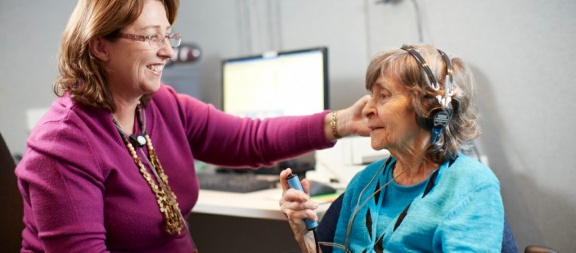The Hearing Service is the UK’s most trusted hearing health care provider, helping over 1000,000 people with the best hearing solutions nationwide. Our organisation has been set up by a team of health care professionals with the ethos of patient centred health care at the heart of all of our work. We pride our clinical excellence to help make the lives of our patients happier and healthier.
Your hearing is one of the most important sense and we know it’s important for you to choose the right people to look after it. With Us, The Hearing Service, we spend time getting to know our customers and what they care about, so that we can offer the utmost best hearing solutions that makes people’s hearing have a positive effect on their quality in life.
Unlike some providers who are more retail orientated, our primary focus is the hearing health status of your ears. We’ll look after you with the highest level of bespoke personal care; with us you’re never just a number; we’ll tailor your experience to suit you and your hearing concerns.
We are a national hearing care provider and specialise in domiciliary hearing service in patients own home or in one of our many clinic centres close to you. Whether you’re looking for information and advice or would like to arrange for a full hearing health check; just call our customer service team to get
booked in 0800 024 8896.
Hearing test
Our fully qualified and experienced team of hearing professionals perform comprehensive hearing test allowing our patients to have a pleasant and informative experience. The variety of possible tests that a hearing aid audiologist can perform is very comprehensive. We provide a home hearing test service which is just as comprehensive as having a hearing test in one of our hearing centres. The general structure of the initial consultation will normally follow the basic structure detailed below.
Get to know your hearing story – Case History
The hearing aid audiologist will start by asking lots of questions about your hearing, your health and other associated topics. It is important that the patient is open and honest as there may be important factors that need consideration
Check the health of the ears – Otoscopy
The hearing aid audiologist will perform a thorough examination of the ear (pinna), ear canal ( external auditory meatus) and ear drum (tympanic membrane). They will use a hand-held otoscope which is essentially a small torch with magnification that can see into the ear canal. Some audiologists may use a video otoscope which can display the image on a computer. This can be a fascinating experience as most people never get the chance to see inside their own ears. The audiologist is looking for any abnormalities or tell-tale signs that can indicate possible problems.
Measure your hearing – Pure tone audiometry (air conduction)
The patient will be instructed press a button when they hear a sound. Headphones will be placed on the patients ears and a variety of different pitched sounds will be played to them at different levels. The main purpose of this test is to establish the quietest sound a person can hear in each ear. This is known as their threshold of hearing.
Bone conduction audiometry
This is a similar test to the air conduction test above however, the headphones consist of a headband that has a vibrating pad on one side and nothing on the other. This vibrating pad is placed against the bone behind the ear (mastoid) and the sound travels directly through the skull and into the inner ear (cochlea). The purpose of this test is to ascertain the location and nature of the hearing loss. If the hearing loss is a result of problems with just the outer or middle ear then the bone conduction test results may show a normal or “zero” reading whereas the air conduction test would show a hearing loss.

